United Nations in China and International Cooperation Center Co-Host the International Symposium on Asia-Pacific Cooperation and Development
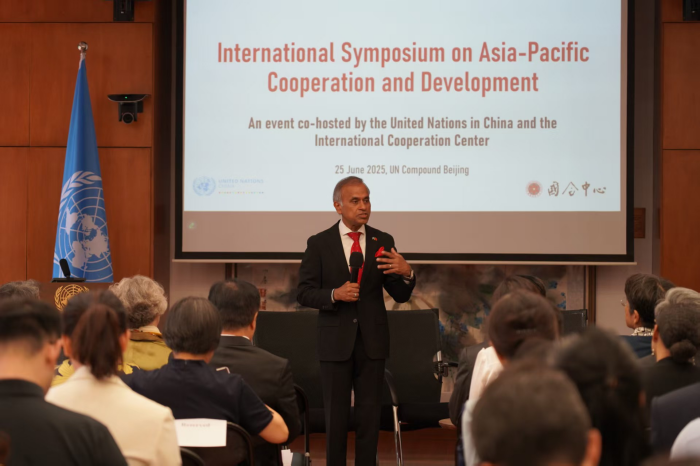
Mr. Siddharth Chatterjee
On 25 June 2025, United Nations (UN) in China and International Cooperation Center (ICC) jointly convened the International Symposium on Asia-Pacific Cooperation and Development at the UN Compound in Beijing. UN Resident Coordinator Siddharth Chatterjee presided over the opening and closing sessions of the Symposium. Armida Salsiah Alisjahbana, UN Under-Secretary-General and Executive Secretary of the United Nations Economic and Social Commission for Asia and the Pacific (UNESCAP), delivered a video address. Ma Shengrong, Chief Expert of the ICC, former Deputy President and Executive Deputy Editor-in-Chief of Xinhua News Agency, attended the meeting and delivered a speech titled "Building Consensus and Deepening Cooperation to Create a Bright Future for Asia-Pacific". Jorge Moreira da Silva, UN Under-Secretary-General and Executive Director of United Nations Office for Project Services (UNOPS), attended this symposium and delivered a closing keynote.
This year marks the 80th anniversary of the founding of the United Nations. The 80-year history has taught us that in the face of the international situation with transformation and instability, the UN-centered international system is an important guarantee for the progress of humanity, and the multilateralism concept based on coordination and cooperation is the best solution to global problems. This Asia-Pacific Cooperation and Development Symposium is held prior to the 17th BRICS Leaders' Meeting, the China-ASEAN Foreign Ministers' Meeting, the East Asia Summit Foreign Ministers' Meeting, as well as the 32nd APEC Leaders' Informal Meeting. It holds significant importance. China has always attached great importance to Asia-Pacific cooperation. It hosted the APEC meetings in 2001 and 2014. From the perspective of promoting the overall situation of Asia-Pacific cooperation, China took the initiative to act and proposed to host the 2026 APEC meeting, which was welcomed by APEC members and approved by the APEC Leaders' Meeting. In 2026, China will be the host of the APEC meeting for the third time. We are willing to take this opportunity to promote communication and cooperation with all parties, jointly implement the APEC Putrajaya Vision 2040, promote the construction of the Asia-Pacific Community and the Asia-Pacific Free Trade Area, and achieve practical cooperation results in various fields, so as to inject new impetus into the economic growth of the Asia-Pacific and the world.
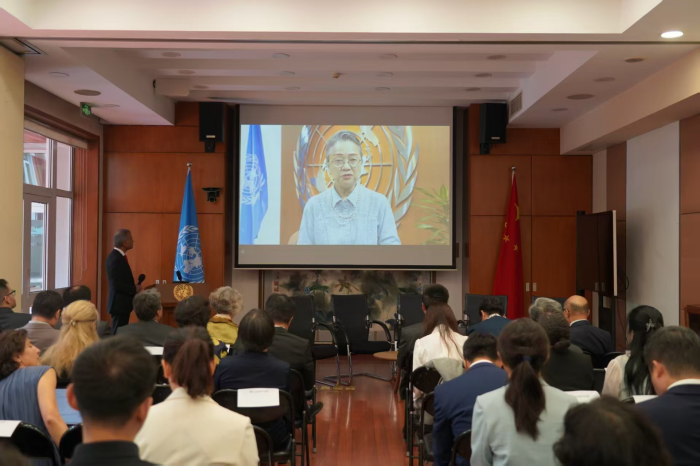
Ms. Armida Salsiah Alisjahbana
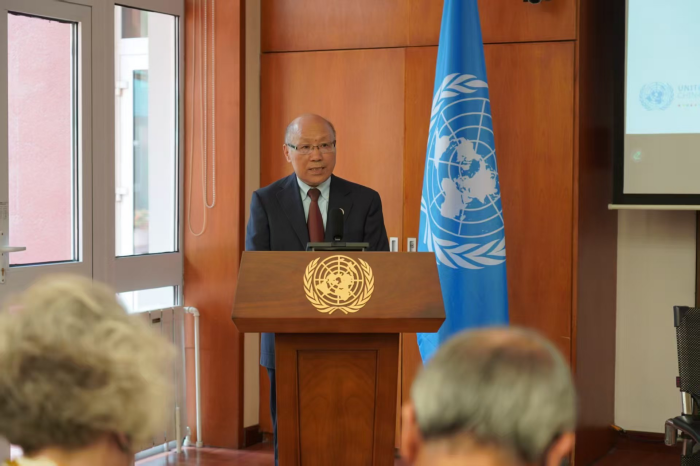
Mr. Ma Shengrong
The symposium pointed out that the Asia-Pacific region is vast in territory and has numerous countries, accounting for 60% of the world's population. Its economic and trade volume respectively account for nearly 60% and half of the global total. It holds an important position in the world's political landscape. Over a long period of time, the Asia-Pacific region has maintained rapid development, ultimately benefiting from the efforts to build an open economic pattern and from the establishment of an Asia-Pacific partnership characterized by mutual trust, inclusiveness, cooperation and win-win results. The development experience of the Asia-Pacific region over the past 30 years indicates that as long as the regional countries jointly maintain the UN-centered international system, practice true multilateralism, adhere to openness, integration and win-win cooperation, they will surely be able to continue writing the miracle of common prosperity and long-term development. In recent years, the development of the Asia-Pacific region has attracted increasing attention and has become the most dynamic and promising region in the world. The Asia-Pacific economy has not only become an important engine of the global economy and a core area of the global supply chain, but also the growth and cooperation methods of the Asia-Pacific region have played a demonstration role in global governance.
The world today is undergoing significant development, transformation and adjustment. The global governance system and international order are undergoing accelerated changes. Protectionism is on the rise in various regions, regional conflicts are occurring one after another, and the process of globalization may face a reversal. The order in the Asia-Pacific region is also facing a reshaping. Regional development benefits from the process of globalization, but is also impacted by the reversal of globalization. The military conflict that broke out in the early part of this month has spread to the Middle East, affecting energy security in the Asia-Pacific region and threatening the political balance of the peripheral countries in the region. This has brought new uncertainties and insecurity to the already highly sensitive Asia-Pacific region with numerous security issues that have been affecting global nerves. This makes the security and stability of the Asia-Pacific region an indispensable part of the global governance system. China promptly issued a diplomatic stance calling for restraint in dialogue, maintaining the authority of the United Nations, and opposing military escalation. In particular, it is crucial to uphold the authority of the United Nations as a multilateralism entity, as well as support the peaceful international order and diplomatic efforts.
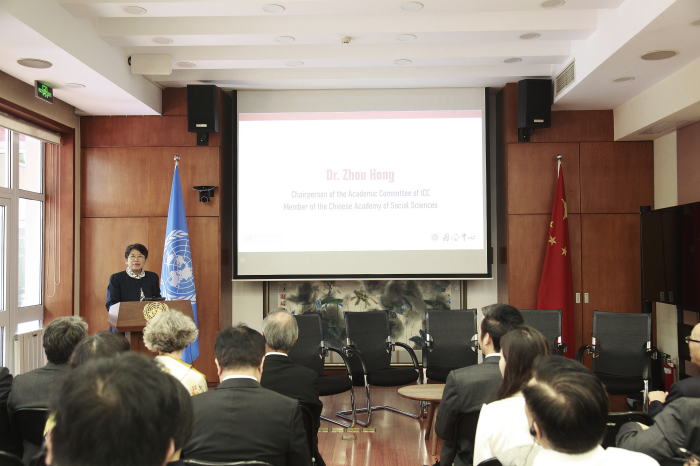
Dr. Zhou Hong
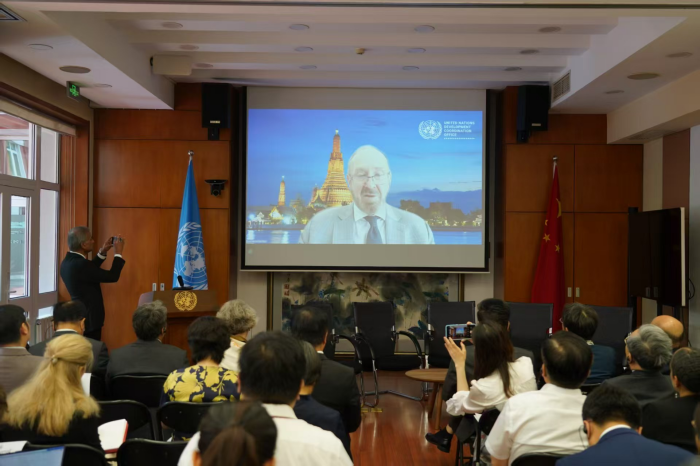
Mr. David Mclachlan-Karr
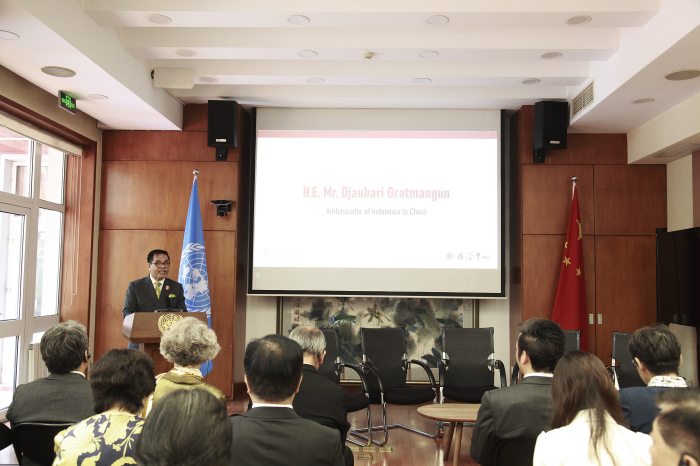
H.E.Mr. Djauhari Oratmangun
Zhou Hong, Chairperson of the Academic Committee of ICC and Member of Chinese Academy of Social Sciences (CASS), David Mclachlan-Karr, Regional Director of the UN Development Coordination Office for Asia and Pacific, and Djauhari Oratmangun, Ambassador of Indonesia to China, attended the meeting. These three individuals delivered keynote speeches respectively based on the conference theme of "Global Governance System and Cooperation in the Asia-Pacific Region". Irene Pivetti, Senior Advisor on International Affairs of ICC, former Speaker of Italian Chamber of Deputies, and former Member of European Parliament, was invited to attend the meeting and delivered a keynote speech.
This Symposium held three panel discussions. Firstly, Nadia Rasheed, Representative of UNFPA in China, Zhang Jin, Deputy Director of Center for International Knowledge on Development, Bilal Mahmood Chaudhary, Deputy Head of Mission, Embassy of Pakistan in China, and Jessica Owens, Regional Social Policy Adviser of UNICEF, discussed the regional practices for promoting the UN 2030 Agenda for Sustainable Development (SDGs); Secondly, Li Yutong, Director of the Center for Sustainable Agricultural Mechanization (CSAM) of UNESCAP, Da Silva Horta Maubere Loro Sae, Ambassador of Timor-Leste to China, Zhou Aiming, Deputy Country Representative of Asian Development Bank in China, and Dun Zhigang, Senior research Fellow of the Chongyang Institute for Financial Studies at Renmin University of China, discussed the reform of international financial system and financing for sustainable development; Thirdly, Simon Clements, Deputy Representative of World Food Programme (WFP) in China, Zhao Qinghua, Minister Counsellor of the International Economic Affairs Department of China’s Ministry of Foreign Affairs (MFA), Paulo Jorge Nascimento, Ambassador of Portugal to China, Di Dongsheng, Dean of the Institute of Area Studies at Renmin University of China, and Qian Xiaojun, Associate Dean of the Schwartzman College at Tsinghua University, discussed the opportunities and challenges of Economic Cooperation in the Asia-Pacific region. The above guests delivered excellent remarks.
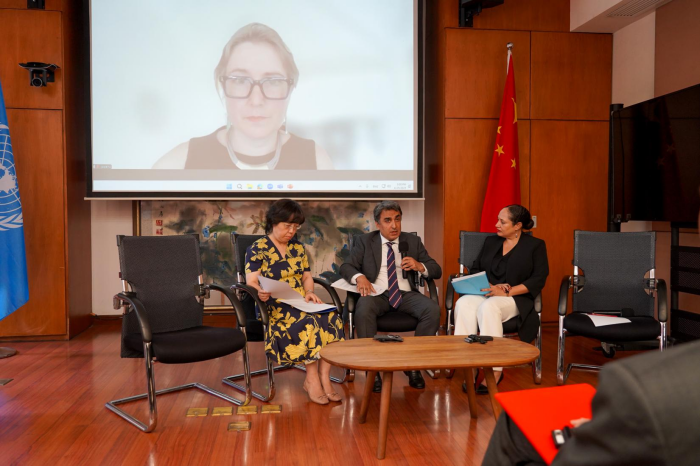
Nadia Rasheed (Right) Zhang Jin (Left) Bilal Mahmood Chaudhary (Middle) Jessica Owens (Video)
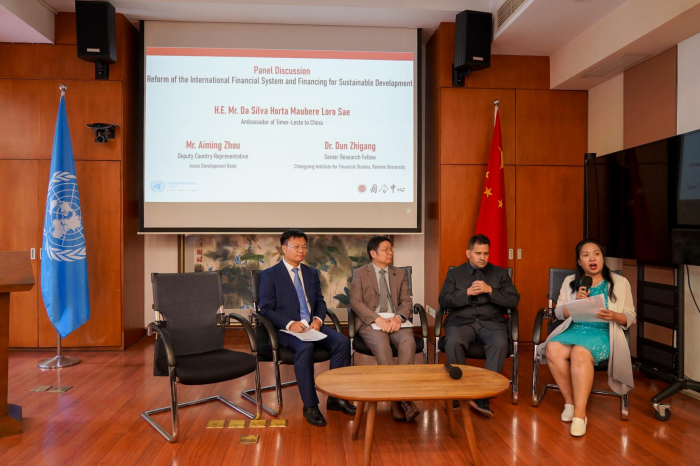
Li Yutong (Right First) Da Silva Horta Maubere Loro Sae (Right Second) Zhou Aiming (Left Second) Dun Zhigang (Left First)
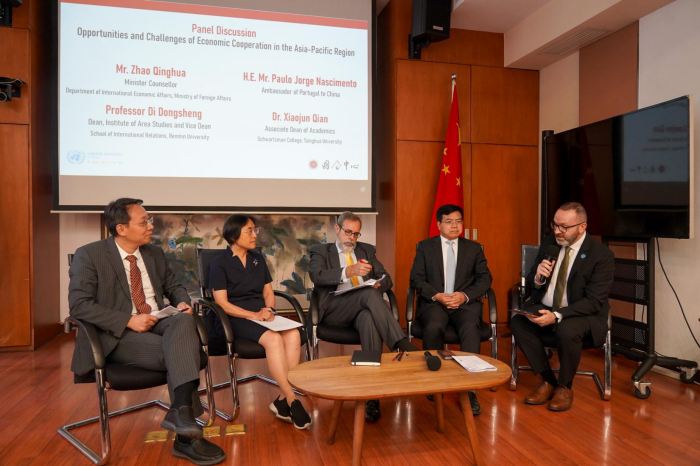
Simon Clements (Right First) Zhao Qinghua (Right Second) H.E. Paulo Jorge Nascimento (Middle) Di Dongsheng (Left First) Qian Xiaojun (Left Second)
The Symposium held that the Asia-Pacific region is not only vast in territory and diverse in culture, but also has significant differences in economic development levels, with varying interests and policy priorities. It is also under pressure from the "camping" and "taking sides" of major powers. Whether in political and security policies, or in economic, trade and financial policies, regional coordination is extremely difficult. After years of efforts by the countries in the Asia-Pacific region, regional cooperation mechanisms such as ASEAN, APEC, and RCEP have been established, as well as China's "Belt and Road Initiative" and the positive effects of the Global Development Initiative. These need to be summarized, improved and applied. Currently, the situation in the Asia-Pacific region is generally stable and positive, with a strong momentum for peace and development. It is still a stable component in the current global landscape. The countries and regions in the Asia-Pacific region currently interact frequently and the cooperation situation is relatively stable. Resolving differences and disputes through dialogue and consultation remains the main policy orientation of all countries. Regional hotspots and disputed issues are generally controllable. The Asia-Pacific economy is currently maintaining a stable and rapid growth, at the "high ground" of world economic growth. Regional integration is accelerating, sub-regional cooperation is flourishing, and various free trade arrangements are advancing steadily. The construction of connectivity is entering a new period of active development. To ensure that the principles of multilateralism run through the actual handling of international affairs, we need to improve the existing system and establish regular communication mechanisms for different topics.
The governance of the Asia-Pacific region should be in line with the expectations of the peoples of the region for regional security and prosperity, and should be committed to the direction of development and progress for all humanity. As one of the most important members of the Asia-Pacific region, China emphasizes the peaceful settlement of disputes, adheres to open regionalism, opposes exclusive group politics, advocates inclusive, open and win-win cooperation, and supports the core role of ASEAN. Over the years, China has actively and proactively integrated into the cooperation and development of the Asia-Pacific region, focusing on practical cooperation in various fields, providing public goods such as climate change, poverty reduction and development assistance, adhering to the principles of multilateralism, supporting the international system centered on the United Nations and participating in global governance reform, and through policies such as jointly building the "Belt and Road Initiative" and promoting the high-quality implementation of RCEP, practicing multilateralism. Chinese leaders have expounded China's propositions at multiple multilateral occasions such as the United Nations, G20 Summit, and Asia-Pacific Economic Cooperation (APEC), on a series of major issues including global and regional situations, Asia-Pacific cooperation, and the future development of the Asia-Pacific Economic Cooperation. They have used China's contributions to promote Asia-Pacific development, with China's wisdom to build Asia-Pacific consensus, and pushed all parties to jointly build an open, inclusive, innovative, interconnected, and win-win Asia-Pacific community.
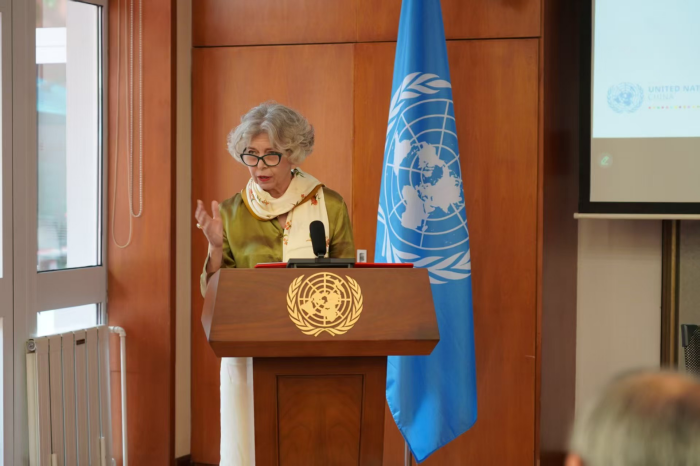
Ms. Irene Pivetti
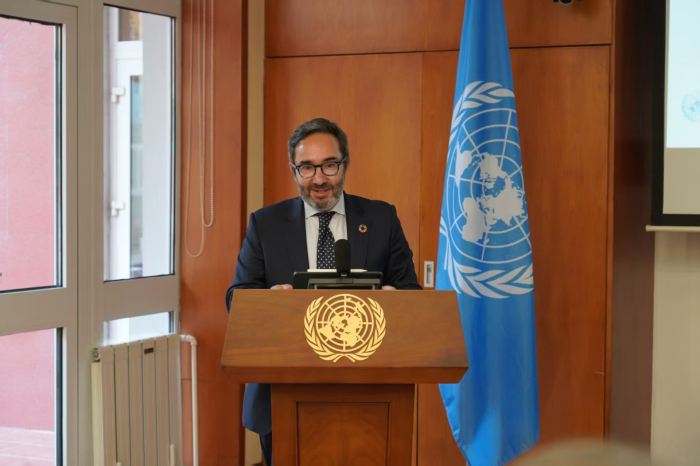
Mr. Jorge Moreira da Silva
More than 100 senior government officials, diplomats, UN experts, and scholars from over 60 countries and regions attended this symposium. The participants unanimously agreed that this seminar provided a strategic platform for all parties to jointly discuss how to advance inclusive, sustainable and resilient development in the Asia-Pacific region, in order to coordinate responses to regional and global challenges, including economic slowdown, digital fragmentation, climate change, and global governance reform. The conference emphasized the importance of regional cooperation, policy adaptability, inclusive innovation, and upholding multilateralism, enhancing regional integration, and promoting open cooperation; it called for specific regional initiatives to support the UN-led governance system, promote peace, development and sustainability. The participants suggested that the Asia-Pacific region should fully utilize its diversity advantages, strengthen cooperation, leverage the coordination mechanism supported by the United Nations, and adopt tailored solutions to address various challenges in the process of achieving sustainable development goals.
The International Cooperation Center (ICC) is a long-term strategic partner of the United Nations in China. The two sides jointly initiated and signed the "International Cooperation Initiative for the Future". In recent years, the two sides have successively held important conferences such as "United Nations Summit of the Future China Preparatory Conference", "The International Dialogue on Development and Cooperation in the Global South", and the "Special Events for Celebrating the 45th Anniversary of the United Nations in China", which have attracted high attentions from political leaders of various countries and the international community. Zhang Zhixiang, Member of the Strategic Advisory Committee of the ICC, Chairman of the International Monetary Research Committee as well as former Executive Director of the International Monetary Fund (IMF) for China, Zhang Yu, Convener of the Joint Meeting and Director of the Steering Committee of the ICC, Mu Dong, Asia-Pacific Affairs Special Representative of the ICC, Zhu Hongshan, Economic Affairs Special Representative of the ICC, Cheng Yu, Executive Secretary-General of the ICC; as well as Members of the Strategic Advisory Committee of the ICC, and Special Representative of the Steering Committee; Representatives from ICC’s Secretariat, the Public Diplomacy Research Center, International Organizations Working Committee, Development Committee, Foreign Exchange Committee, and Hong Kong, Macao, Taiwan and Overseas Chinese Working Committee attended above activity.
Related Links:
https://mk.haiwainet.cn/n/2025/DE/011E1214794275479976320.html

